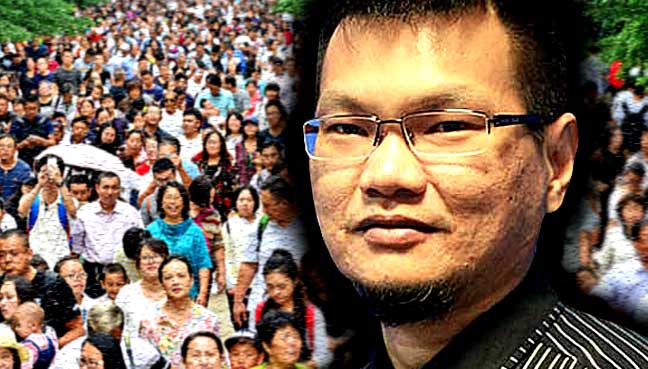The kingmakers of Sabah

(FMT) – Chinese voters are again set to make a difference in Sabah.
The walkabout has emerged as a favourite for politicians who wish to press the flesh.
This is especally so with Sabah politicians, ahead of the Chinese New Year festivities.
They take every opportunity to go to the markets and shopping areas to greet traders and their customers.
Over the past two weeks, leaders from both sides of Sabah’s political divide, including PBS president Joseph Pairin Kitingan, LDP president Teo Chee Kang, Parti Warisan Sabah chief Shafie Apdal and state Pakatan Harapan chief Christina Liew, have been going all out to meet the people.
Also making their rounds are leaders of other opposition parties such as SAPP, which is part of Gabungan Sabah.
It is no coincidence the areas they go to such as Lido market, the Sunday Gaya Street Fair and Foh Sang here are located within constituencies where the Chinese make up the majority of voters.
The Chinese-majority seats include the parliamentary constituencies of Kota Kinabalu, Penampang and Sandakan, won by the opposition in the 2013 polls.
The state seats where Chinese voters comprise at least 30% of the electorate include Api Api, Inanam, Likas, Luyang, Kepayan, Karamunting, Elopura, Tanjong Papat and Sri Tanjong.
A political analyst here noted the community was expected to have a great influence in seats where their numbers are smaller but where they could tilt the outcome of the polls.
Universiti Malaysia Sabah Humanities, Arts and Heritage Faculty senior lecturer Dr Lee Kuok Tiung reckons that Chinese voters can make a difference in seats where they number as little as 1,000 to 2,000.
He said this was because the Chinese tend to vote as a bloc while the ballots of other communities would be split according to the contesting parties.
Lee said this was apparent in Penampang where Chinese voters make up 30% of the electorate.
In 2008, the Chinese backed the then Barisan Nasional candidate Bernard Dompok, of Upko, who secured a 3,063-vote majority over his closest rival Edwin Boston, then from PKR.
Lee reckons Dompok’s fortunes changed abruptly in 2013 when he lost to newcomer Darell Leiking of PKR by 10,216 votes, partly because the Chinese bloc of votes no longer went to him.
He said Chinese voters could also make an impact in seats that were won or lost by a slim majority of about 5%.
Lee said it would however be incorrect to generally classify all seats where Chinese voters hold sway as heading into the opposition hands in the coming polls.
“There are a number of factors to consider. For example, there is a tendency for voters to want a change after two terms,” Lee said.
“Their incumbent will repeat the call to give him or her a chance. But if there are no significant changes in their areas after 10 years, voters will decide that a change is needed.”
Asked about the perception that voters in Chinese-majority areas tend to vote for the DAP “brand”, Lee said this was changing as evident in the drop in donations the party was getting from its fund-raising projects, such as dinners, over the past year or so.
A factor that could make a difference was also the candidate in a particular area, he added.
Lee said the “right” candidate was a crucial factor in non-Muslim Bumiputera-majority areas.
“We saw this in 2013 when Pairin had announced the candidates for the state seats of Matunggong, Kiulu and Inanam, but there was a sudden last-minute change.”
He said PBS commanded a consistent bloc of votes in non-Muslim Bumiputera-majority or in mixed areas such as Inanam where party officials reckon they can bank on at least 5,000 ballots.
However, this bloc could turn into protest votes, as evident in Matunggong and Inanam, where BN candidates from PBS were defeated while the ruling coalition barely scraped through with a 44-vote majority in Kiulu.
They may not be the majority in terms of Sabah’s demographics but non-Muslim Bumiputeras and the Chinese community will once again make their presence felt in the coming polls.

